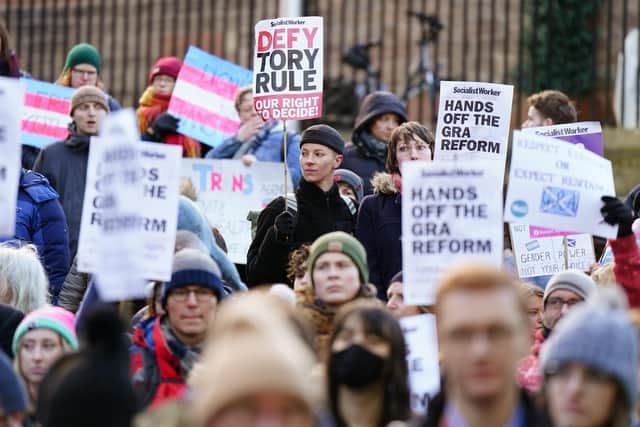MSPs have only themselves to blame for latest Scotland gender recognition row - Euan McColm
The reaction was entirely predictable.
Judge Lady Haldane’s ruling that Scottish Secretary Alister Jack had acted lawfully in blocking Holyrood’s reform of the Gender Recognition Act was followed by howls of outrage from the top of government.
First Minister Humza Yousaf said the legal decision – published on Friday – marked a “dark day for devolution”. The judgement confirmed “beyond doubt” that devolution is fundamentally flawed and that legislation passed by a majority in Holyrood could be struck down by Westminster.
Advertisement
Hide AdAdvertisement
Hide Ad

Maggie Chapman, equality spokesperson for the SNP’s partners in government, the Scottish Greens, slipped effortlessly into the realm of the ridiculous. This was a “devastating day for equality”, “a democratic outrage, crushing basic rights and equality for some of Scotland’s most marginalised people” and confirming that “the UK Government refuses to see our trans siblings for the people they really are”.
But all that sound and fury mustn’t be allowed to conceal the truth which is that the MSPs who drove through legislation which would have permitted trans people to self-ID and then gain access to single sex spaces are entirely to blame for this outcome.
When, last December, members of all parties at Holyrood voted in favour of reforming the GRA, they did so having ignored numerous voices warning the process was flawed. The majority of MSPs blanked feminist campaigners who complained the legislation would destroy the right to establish and run spaces for women based on biological sex and, perhaps more pertinently, refused to listen to legal experts who pointed out that – since equality law is reserved to Westminster – differences between the GRA in Scotland and elsewhere in the UK would be unworkable.
It was this inconsistency that led Alister Jack to block the legislation with the first use of a Section 35 order since the establishment of the Scottish Parliament in 1999. A change in the law in Scotland would, he argued, impact upon the UK-wide Equality Act. Lady Haldane’s ruling vindicates Jack’s decision and the reason underpinning it.


As we all know, the issue of trans rights is a controversial and emotive one. The discussion of the collision between the rights of men who begin to identify women and the rights of biological women has frequently been ugly. A number of feminist campaigners have been physically attacked by trans-rights activists over recent years. And discussion over whether young people should be supported - and medicated - through transition has been every bit as intemperate.
But these arguments – and the emotions of those involved – are not, I’m afraid, relevant. This is about good, workable law.
The Scottish Government pushed ahead with legislation that was doomed to fail. This was either an example of great optimism, driven by compassion, or of shocking incompetence. I prefer the latter.
Social Justice Secretary Shirley-Anne Somerville complained, on Friday, that at no stage of the GRA reform process had the UK Government indicated it might use a Section 35 order. What a cynical response. Does Somerville really expect us to believe the Scottish Government would have welcomed such guidance from ministers in London?
Advertisement
Hide AdAdvertisement
Hide AdOf course, any such interjection from Westminster would have been met with furious denunciation. And, anyway, it’s not the job of UK Government ministers to monitor, for competence, the work of their counterparts at Holyrood.
I wonder whether those Scottish government figures now raging against the Court of Session ruling have fully considered the implications of their criticisms. If this truly is an example of the UK Government working to undermine the devolution settlement, then Lady Haldane must be complicit. Does Humza Yousaf believe that a judge in Scotland’s highest court is actively engaged in a campaign to damage democracy?
If he does, he lacks the bottle to come out and say so.
Senior Scottish politicians have exposed their foolishness over this matter. Take deputy First Minister, Shona Robison, for example. Last year, she told Holyrood “There is no evidence that predatory and abusive men have ever had to pretend to be anything else to carry out abusive and predatory behaviour”, words which were to come to haunt her when the case of Andrew Miller came to court. Miller was convicted of kidnapping and sexually assaulting a young girl who he lured into his car while dressed as a woman.
At every stage of the process to reform the Gender Recognition Act, senior Scottish political figures have put ideology first. Former First Minister Nicola Sturgeon dismissed concerns from feminists as “not valid”, preferring to take guidance on the matter from pro-reform organisations which are largely funded by the Scottish Government.
MSPs who backed reform can often be heard claiming that this legislation is the most consulted upon in the history of Holyrood. The fact is that the consultation process was completely flawed. Members of the Equalities, Human Rights, and Civil Justice Committee, of which Maggie Chapman is deputy convener, spent far more time listening to the views of government-funded activists who supported the policy change than they did listening to cautionary voices. Boasting about legislation being the most consulted upon when it’s abundantly clear that consultation was a mess is to confirm one’s incompetence.
Yousaf will now decide whether to spend yet more public money appealing Lady Haldane’s judgement. He will have to consider a number of factors, including polling showing little more than a fifth of voters support reform of the GRA while more than half oppose it.
The First Minister will also have to weigh up the value of his working relationship with the Scottish Greens, for whom this is a red-line issue. Is he willing to throw good money after bad in the name of keeping the Greens in government?
While Humza Yousaf weighs up his options, there are those who feel betrayed by Friday’s ruling. They should be in no doubt that the fault lies with MSPs who promised them something they were never legally able to deliver.
Comments
Want to join the conversation? Please or to comment on this article.